








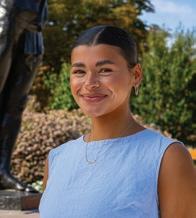
EDITOR -IN-CHIEF: Bella Hughes
MANAGING EDITOR: Emma Love
COPY CHIEF: Caden Dyer
NEWS EDITOR: Shelby Wright
ARTS & CULTURE EDITOR: Emma Caskill
SPORTS EDITOR: Caleb Jarreau
ASSISTANT SPORTS EDITOR: Trevor McGee
OPINIONS EDITOR: Ansley Graves
PHOTO EDITOR: Erick Gomez-Villeda
DESIGN EDITOR: Ciara Chauncey
ENGAGEMENT EDITOR: Sarah Portanka
COVER DESIGN: Ciara Chauncey
PAGE DESIGNERS: Emma Fingeret, Jibril Foronas, Ashley Cammarota, Abigail Thompson
ADVERTISING MANAGER: Cullen Askew
ADVERTISING REPRESENTATIVES: Jacob Stromatt
ADVERTISING PRODUCTION ARTISTS: Donatella Thomas
TO REPORT A NEWS ITEM OR SUBMIT A PRESS RELEASE, please email editorinchief@utdailybeacon.com or call (865) 974-2348
TO PLACE AN AD, please email admanager@utk.edu.
LETTERS POLICY: Letters to the Editor must be exclusive to The Daily Beacon and cannot have been submitted to or published by other media. Letters should not exceed 400 words and can be edited or shortened for space. Letters can also be edited for grammar and typographical errors, and Letters that contain excessive grammatical errors can be rejected for this reason. Anonymous Letters will not be published. Authors should include their full name, mailing address, city of residence, phone number and e-mail address for verification purposes. Letters submitted without this information will not be published. The preferred method to submit a Letter to the Editor is to email the Editor-in-Chief.
CORRECTIONS POLICY:It is the Daily Beacon’s policy to quickly correct any factual errors and clarify any potentially misleading information. Errors brought to our attention by readers or staff members will be corrected and printed on page two of our publication. To report an error please send as much information as possible about where and when the error occurred to managingeditor@ utdailybeacon.com, or call our newsroom at (865) 974-5206.
The Daily Beacon is published by students at The University of Tennessee on Wednesday during the fall and spring semesters. The offices are located at 1345 Circle Park Drive, 11 Communications Building, Knoxville, TN 37996-0314. The newspaper is free on campus and is available via mail subscription for $200/year or $100/semester. It is also available online at: www.utdailybeacon.com
BELLA HUGHES Editor-in- Chief
I have a core memory of making brownies and lemonade with my parents on Election Day in 2008. We lived across the street from my elementary school and I didn’t fully understand why I couldn’t go to school that day.
I knew it was Election Day, but I was more confused by the fact that there were cars in the parking lot and I couldn’t see my favorite teacher.
As a compromise, my parents and I gathered in the kitchen, and Mom and my sister mixed brownies while Dad and I poured sugar and squeezed lemons. Once the recipes were completed we walked across the street as a family and delivered our treats to the poll workers.
I was so excited to one, be at school when none of my classmates were, and two, to reward the poll workers with a treat. The smiles on their faces, the conversations we had and playing a part in democracy — even at 5 years old — left a lasting impression.
Flash forward 16 years later, I get to be on the other side of the voting booth. Since I was 18, I always looked forward to Election Day. Selfishly, I wanted the sticker — and yes, I have a collection of “I voted” stickers at home — but realistically, I wanted to become civically involved in my community.
I am from Georgia — a state that has recently become a swing state and political powerhouse. I’ve seen the weight of an election’s outcome on my home state, and I understand the value in the saying ,“every vote counts.”
Being an out-of-state-student, I try and make a weekend out of voting. I’ve participated in early voting in senate runoff, traveled home for local elections, and now, I get to travel home to vote alongside my parents in my first presidential election.
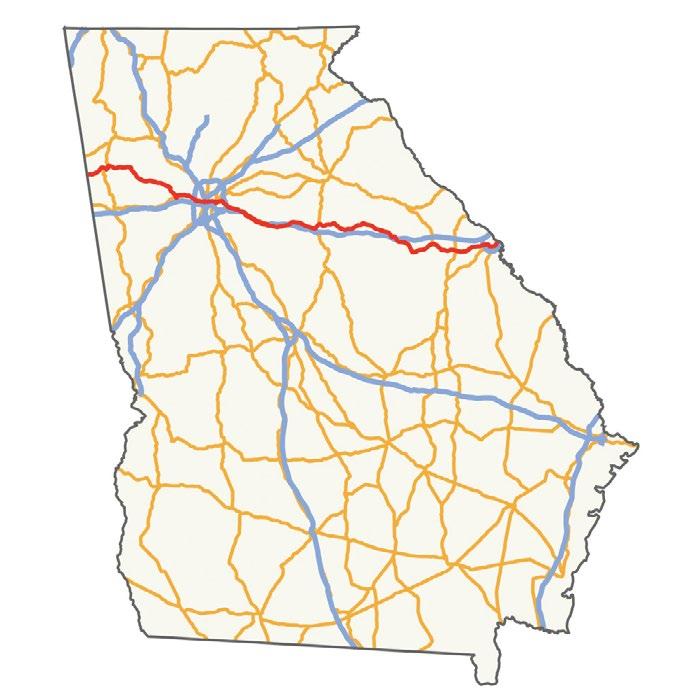
Georgia was a swing state in the 2020 presidential election. Being a Georgia native, Bella Hughes sees the significance in casting a vote. Courtesy of Creative Commons
Whether you are an first-time voter, choosing not to vote, an undecided voter or a dedicated voter, election season likely means something to you. This election guide serves as an information-based resource to help inform your voting decision. From foreign policy breakdowns, tackling inflation as a college student, and a Q&A from a Democrat and a Republican, this issue attempts to share balanced stories for college students.
The majority of the student population is voting in their first presidential election. Let’s be mindful of our poll workers, greet them with a smile, be patient in line, and offer them a sweet treat and lemonade — they deserve recognition, too.

EMMA LOVE Managing Editor
I am not one to discuss politics with others or to publicly promote one person or party over another. In such a polarized country, I’ve found that it’s more important to me to promote ideals and values instead, as those are what truly impact every citizen day in and day out.
While there are plenty of issues to be solved by governmental means, I believe there are so many more that we can be and should be solving through social means.
Regardless of our stance on issue A, do we have empathy for one another? Regardless of our stance on issue B, do we actively show kindness toward one another? Regardless of our stance on issue C, do we respect each other? So on and so forth.
I’d argue that those social matters are the heart of our roles as citizens. With that said, there is one political matter I’ll vocally address: voting down the ballot.
You may have felt before that your vote for a presidential candidate doesn’t matter because the president’s decisions typically don’t impact your day-to-day life. While your vote does still matter, that’s an understandable perspective.
Thus, it’s important that we remember whose decisions do impact our day-to-day
lives. Who are the people making decisions about your state? Your city? Your schools? Those candidates are on the ballot too.
Refrain from getting bogged down by topof-the-ballot decisions. Save some of your decision-making energy on researching the candidates in your local elections. Not only do these positions have a greater impact than the national positions on your community, but you also have a greater impact on them than on the
national level.
Also found on some ballots are referendums or amendments to the state constitution. These are specific laws or policies that we, as voters, get to have a direct say on. Pay attention to these, as we don’t get this kind of opportunity often.
Take advantage of these opportunities to play a more influential role in our democracy.

LOUIE PERRY Staff Writer
With high prices and rising inflation in recent years, Americans have put the economy as the most important issue influencing their vote in this upcoming presidential election. The Inflation Reduction Act, or IRA, was a piece of legislation passed in August 2022 that was supposed to address bringing down inflation, but when you look closer, its main focus was on clean energy and sustainability, with minor parts on reducing inflation.
Inflation measures the rate at which prices in the economy rise, and since the COVID-19 pandemic between 2020-24, America has seen some of the highest levels of inflation.
At its peak, inflation levels reached 9.1% in June of 2022, right around the time when the IRA was passed into law. Today, the levels are close to 2.4%, a healthy level for an economy. Yet, the legislation passed was not focused on economic relief for Americans, but instead on the transition of American industry towards green energy and sustainability.
“Sometimes pieces of legislation are named for political reasons rather than to precisely reflect what the content of the actual policy is. And the Inflation Reduction Act is an example of that case,” Timothy Fitzgerald, a professor of economics at the Baker School of Public Policy and Public Affairs, said.
According to the White House website, the policy “redefined American leadership in confronting the existential threat of the climate crisis and set forth a new era of American innovation and ingenuity to lower consumer costs and drive the global clean energy economy forward.”
The reduction of inflation can be attributed to the work of the Federal Reserve, which tweaked and adjusted interest rates over the last three years mainly by increasing those rates, not the Inflation Reduction Act. This helped to stop the flow of money and investments into the economy, which in turn helped to slow economic movement, lowering inflation.
During this high inflationary period, the average price of goods increased by 21.8%. It’s a reason why the economy is such a hot issue for the upcoming 2024 election as Americans have watched prices for goods dramatically increase. For example, what a $1,000 would have gotten you in the past, now costs

$1,211.34 dollars today.
Ruth Rownd, a freshman majoring in pre-law and political science said, “As a new college student adjusting to making purchases on my own, going (to) the grocery store (has) been truly shocking, seeing how much higher the prices of some items are now versus just a few years ago. Unfortunately, this made my adjustment all the more difficult.”
However, reducing inflation doesn’t mean that prices will go down too. Those lower prices that many Americans were used to before the pandemic may never reappear or the high prices may lower slightly, just not to the same levels of the past.
Healthcare costs
We now shift gears to the specifics of the act. The main portion that addresses rising prices and inflation is the portion on healthcare.
“The inflation reduction part of the IRA is most plausibly the authority to allow Medicare to negotiate prescription drug prices,” Fitzgerald said.
Medicare programs, a federallyfunded medical insurance program for people over the age of 65, can put caps (set prices) on drug costs. The periods of high inflation led to the rise in drug prices; thus, the law allows for Medicare programs to have the ability to cap prices in order to make the outof-pocket drug costs more accessible during a highly priced economy.
Insurance programs will only pay a certain portion of the prescription cost, which means the other portion, out-ofpocket, comes from your wallet. So by capping the price, it makes them more affordable.
“Without large savings from the prescription drug savings in Medicare,
the IRA looks more like a government spending program,” Fitzgerald said.
So what was the Inflation Reduction Act if its main focus wasn’t on reducing inflation?
“There is a broad consensus that the IRA was a vehicle for energy and other proposals, more than a targeted tool for fighting inflation,” Fitzgerald said.
The IRA “enhanced or created 20 tax incentives for clean energy and manufacturing,” the Treasury Department website said.
These tax incentives focused on how businesses and production can turn their actions away from climate-changing practices and toward green energy. With a total of $400 billion in federal funding via tax incentives, write-offs, loans, etc. the Biden-Harris Administration hopes that these economic efforts will lower America’s carbon emissions by 2030.
For instance, the federal government will give $12 billion to help offer more loans for green energy infrastructure while also creating an additional program of $250 billion dollars for updating outdated technology that causes climate change.
That updating of technology will “(create) opportunities to build projects, hire workers and manufacture equipment needed to strengthen domestic supply chains, lower household energy costs while reducing greenhouse gas emissions and pay good wages for those efforts,” according to the United States Treasury report on the implications of the IRA.
For everyday Americans, there will be additional tax credits for purchasing green energy technology (electric vehicles, solar panels, energy-efficient
appliances for kitchen and other uses, batteries and many more additional tech). By incentivizing everyday Americans to invest in technology that uses green energy, the Biden-Harris Admin hopes to reverse climate change impacts.
Some critics of the IRA have said that the legislation pumped more money into the economy, causing inflation levels to rise.
Fitzgerald commented on this critique of the law, highlighting that it’s more nuanced. It could have the potential to overheat the economy with a large money flow into investments and tax incentives, but he hasn’t seen enough evidence that the IRA caused the inflation.
He did say, however, that the large amounts of stimulus relief payments between 2020-21 plus an additional three large fiscal spending programs— the Bipartisan Infstruce Law in 2021, the CHIPS Act and then the IRA — all put heavy amounts of money into the economy and together could help to fuel the inflation issue.
The question is whether this hurts or helps Harris in the long run as she casted the tie-breaking vote for the IRA in the Senate. It may not have been a strong law on reducing inflation, but it was a win for those who support green energy practices. And with under 20 days until election day, voters will decide who they want to lead the economic policy of the country. The one unique aspect of the election is that Americans have an idea of what each administration may look like with both candidates being in office before. This could either be a good or bad thing for each administration.
BELLA HUGHES Editor-in-Chief
The Daily is a digital extension of The New York Times. Uploading daily, the half hour episodes cover a range of world topics and current events. For election season, NYT produced a series of episodes concentrated on a specific policy. Episodes include economy breakdowns for primary candidates, the importance of swing states and debate debriefs. New York Times subscriptions are free with your student email account. Episode recommendation: “Trump v.s. Harris on the Economy”
This episode takes a deep dive into each candidate’s economic plan. Jim Tankersley, economic policy reporter for NYT, joins host Micheal Barbaro in a detailed coversation on how the candidates plan to use the power of government to decrease the cost of living. A metaphor was used to summarize each policy.
The NPR Politics Podcast
NPR is an unbiased and straightfoward source that gathers informed and educated sources to join the conversation. Each episode lasts about 15 minutes and highlights all aspects of a political campaign. Episodes have covered immigration, natutral disatsters and state-by-state polling results.
Episode recommendation: “They hate Biden. They hate Trump. One’s gone. Now what?”
This episode targets the undecided voter, dissecting quantitiave and qualitative data conducted through a focus group. They found that after Harris was announced, many undecided voters became pro-Harris or pro-Trump once Biden
political vocabulary, legistaltion and issues surrounding yearly politics. The website primarily targets new voters who don’t fully understand political jargon. Topics include deepfakes and the use of AI in the presidential election, debt ceilings and the regulation of free speech online. Many topics are gnerated with the Gen-Z demographic in mind. This is a strong resource to use if you have topic-specific concerns and want to learn more about the issue as a whole before deciding which candidate best aligns with your stance.
This past weekend with Theo Von, featuring Donald Trump
Theo Von is an internet personality and comedian. The guests on his podcast range from other comedians, celebrities and just recently, politicians Bernie Sanders and JD Vance. Von has a Gen-Z and millennial audience and takes a comedic approach in political interviews. In an attempt to humanize political candidates, Von keeps a casual persona and asks questions for the listerner to relate to the guest.
In the interview with Trump, the duo speak on the drug epidemic in America, efforts to increase transparency in healthcare and border security. This is one of the few long-form recorded interviews during the campaign cycle, and Von takes advantage of the opportunity by offering trust and a sense of ease between him, Trump and the listener.
Call her Daddy, featuring Kamala Harris Harris also spoke with an internet sensation during her campaign run. Podcast host Alex Copper interviewed Harris with regard to women’s healthcare and abortion rights. Cooper calls out

dropped out of the race. It is important to note that they only surveyed 12 individuals, and out of those surveyed, 10 of them could back their answer on why they are supporting a specific candidate.
This podcast takes an approach at tackling what many Americans thought when Biden dropped out: Can Harris pull off a campaign in a limited time?
Founded by actor Chris Evans, this website provides short video clips and explainers on
that she didn’t know whether or not to get involved in election press, but felt that her predominantly female audience could benefit from a conversation on reproductive rights.
This interview took a similar approach to Von and Trump’s, as the interview allows an opportunity for Harris to tell personal stories and establish a view as a rounded person — not just a political candidate. This interview covers Harris’ career history, including her time as a prosecutor in California and how she never backs down from a challenge. This episode gives in-depth insight into the reality and future of reproductive health.
On Oct. 16, early voting in Tennessee began for the upcoming presidential election. Students native to the state are starting to cast their ballots and those who are out of state will begin this phase shortly, if not already. Knowing you’re making the right decision on your ballot is an internal struggle the entire country is facing.
Two students at UT who are voting for opposing parties in the upcoming election sat down to talk about why they are making their decision to vote either Republican — Donald Trump — or Democrat — Kamala Harris.
Samuel Smith, a sophomore at UT studying public affairs, is voting for Donald Trump in the upcoming election.
Savannah Jobkar, a second year master’s student at UT studying biosystems engineering, is voting for Kamala Harris in the upcoming election.
*These interviews have been edited for clarity.
When did you know you were going to vote for this candidate?
Smith: Probably after the nomination, especially after he got shot and survived. I’ve always been sympathetic to Trump but I wouldn’t say I am a die-hard Trump fan.
Jobkar: As soon as I found out that Trump was the Republican candidate and when they announced Harris as the candidate after Biden dropped out.
What characteristics appeal to you about this candidate?
Smith: Being an outsider is one characteristic. … He doesn’t come from a political background. I also think it is admirable that he has been saying the same things all throughout his career and life. He also seems to be more authentic than most politicians but, it is hard to say from an outside perspective.
Jobkar: I think she’s a good representation of all Americans. She has very good plans for everyone, and she’s a very good role model to look up to. She worked to get where she was with all of her law degrees, she’s very respectable, so I think she’s earned her spot, really.
What characteristics don’t appeal to you about this candidate?
Smith: Yes, I am a conservative Christian and I don’t really know if he stands for those values, but I also think if you look at any politician’s secret lives, they probably all have dirt.
Jobkar: No, not really.
What policies within this candidate’s administration appeal to you?

We spend too much money, and so much of it goes to nothing.
Jobkar: For me, I like that she has a plan. There is the up to $25,000 down payment for first-time homebuyers, she has plans for supporting small businesses in the US … I also think it is very important that she has a plan for helping families with newborns by giving the child tax credit. She also wants to lower taxes for the middle class, and she is looking to restore Roe v. Wade, in which I personally believe that your access to abortion care should not be determined by your coordinate location in the US. Other policies that appeal to me are her policy to erase medical debt and my favorite one is her policy that ensures nobody is above the law meaning no immunity for former presidents.
Are there policies within this candidate’s administration that don’t appeal to you?
Smith: I wish he had more of a plan to address the size of the government and cutting it down.
Smith: I want to see the wars ended in Ukraine and Israel, and Trump has promised to do that — hopefully he will. He has promised a lot about the border situation — he has promised to deport all of the illegal immigrant criminals, I think that would be a good thing. Another big thing is tariffs.
Jobkar: I don’t think so. The only thing that I want to know more about that would affect me is when she says she wants to strengthen social security and Medicare, what does that look like?
Why would you encourage others to vote for this candidate?
Smith: War, number one. We are sending weapons to Ukraine that could strike Russia, this (is) a serious act of war. Trump has been insistent that there were no wars in his administration and Harris is in office and the Israel and Ukraine war started. I think nuclear war — a pre-eminent issue that would affect everyone — is less likely to happen under Trump’s administration.
Jobkar: I’m passionate about people knowing who they’re voting for. I am not forceful about it but I have the facts about both candidates to help others make an educated decision.
Is there anything that this candidate could do that would make you vote for the opposing candidate?
Smith: If Trump were to come out and say that the U.S. was going to war with Iran or Russia, I would consider voting for Harris. I think the Democratic party is the ruling party right now and I don’t think anybody believes Biden is making decisions every day, and I don’t think Harris will either.
Jobkar: It’s hard for me answer this question because there’s no way she could stoop to Trump’s level within the remaining time period of the election. Realistically, yes I would vote for the opposing candidate if she were to go off the deep end, worse than Trump already has, but there is no way she can be a 34-count convicted felon in that time period.
At any point in this election were you thinking about not voting?
Smith: No, I want to vote. If you are a citizen, you have an obligation to vote.
Jobkar: No.
SHELBY WRIGHT News Editor
As college students, it can be difficult to discern how a president’s stance on foreign policy issues affects us. Not every student has access to political science courses or someone who can break down these complicated issues.
Competing administrations will take very different approaches to foreign policy in this coming presidential election, which could significantly impact Americans at home.
Krista Weigand, the director of the Center for National Security and Foreign Affairs and professor at the Baker School of Public Policy and Public Affairs at UT, is an expert on foreign policy and spoke to the Beacon about these issues.
The U.S. Constitution outlines the president’s responsibility to serve as the commander-in-chief of all military forces and oversee all defense decisions.
“So he or she is really the final decisionmaker of all foreign policy related to military, defense and national security,” Weigand said. Therefore, whether presidents are directly involved in foreign negotiations or not, their stances on specific policies have an impact on the outcome of various relations worldwide.
Currently, there are several international crises and national interest issues that the U.S. is very concerned about.
In attempts to keep peace in the past, the Trump administration focused its efforts on the relationships between the Arab countries in the Middle East and Israel, whereas the Biden administration has focused on improving relations with U.S. allies in the Indo-Pacific region and Asia.
It is likely that the former president and vice president will continue to focus their peace efforts in these areas as they did under their previous administrations, according to Weigand. However, looking forward, it is crucial that both Trump and Harris focus their attention on the wars between Ukraine and Russia and Israel and Gaza, as these wars have the ability to throw the U.S. and the rest of the world into a major war through collective defense contract as mentioned in Article 5 of the North Atlantic Treaty Organization that states that any armed attack against one ally is an armed attack against all allies.
NATO and the war in Ukraine
Trump’s criticisms and claims of pulling out of NATO, and the recent push of populism and isolationism from some conservative politicians, have raised concerns on the side of foreign policy as Trump proceeds in his campaign.
“A lot of people criticize NATO and say, ‘you know, it’s not really effective. It’s just, it’s just a legal organism — Article 5 is just a legal article that doesn’t carry much weight,’” Weigand said, “But at the same time, so far, it has actually worked for 50-plus years.”
So far, Article 5 is a powerful reason why Russian President Vladamir Putin has not invaded other countries like the Baltic States — Latvia, Lithuania and Estonia, according to Weigand.
“(Putin) can’t afford to fight a war against all of the NATO military. … I don’t think he wants that war, and the U.S. certainly doesn’t want a war against Russia. And so that article is actually really powerful right now, and it seems to be working, and it seems to be holding,” Weigand said.
Weigand told the Beacon that she believes Trump’s claims are probably shallow. If elected, his stance will be to convince other NATO countries to invest more time and expenses into the NATO military budget because the U.S. has traditionally been the largest military and economic power among NATO member states.
“Tump’s a very transactional president because he’s a businessman — he’s thinking much more about business and economics … because the U.S. has a huge debt,” Weigand said, “So he wants the U.S. to not have to carry such a burden, financially and militarily.”
Harris said as she accepted her Democratic nomination that she would stand by Ukraine and its NATO Allies.
On the other hand, in the war between Israel and Gaza, the Trump administration has made it clear that they stand on the side of Israel, and so has the Biden administration. However, it is unclear how Harris would handle this situation if she were elected president in November.
The Biden administration has been criticized heavily for their support of Israel — a position that many people in America disagree with because of human rights issues and atrocities happening on both sides of the battlefield. Now, it’s been assumed by many that Harris

would kind of inherit this reputation as the current vice president.
However, this is not known for sure.
“I think that’s going to be the major distinction between Biden and Harris,” Weigand said. “She’s going to be a little more open to criticizing Israel with regards to human rights.
… When (Biden) finally said, ‘We’re concerned about human rights,’ it kind of fell short because he had already been so vocal about supporting Israel.”
This is a tricky situation because Israel is a U.S. ally, and now — with Iran’s recent attacks on Israel and their potential influence on terrorist groups Hamas and Hezbollah — the U.S. is obligated to come to Israel’s aid.
In Harris’ first sit-down television interview with her running mate Senator Tim Walz on CNN, she discussed her stance on the war in Israel and the human rights issues there.
“Let me be very clear. I’m unequivocal and — and unwavering in my commitment to Israel’s defense and its ability to defend itself. And that’s not gonna change,” Harris said. “But let’s take a step back. Oct 7: 1,200 people are massacred. … Women were horribly raped. As I said then, I say today, Israel had a right — has a right — to defend itself. … And how it does so matters. Far too many innocent Palestinians have been killed. And we have got to get a deal done. … This war must end.”
There’s also massive concern about China’s rise in power and the modernization of its military in terms of its new development of nuclear weapons, regular weapons, ships, tanks and airplanes.
China has also made overt threats about invading Taiwan — a U.S. partner. Therefore, going forward, the U.S. has a very real and strategic interest in protecting Taiwan and preventing China from threatening other Allies and partners in the Indo-Pacific region.
One policy issue that both Trump and Harris plan to impose — or continue to impose — to
keep China in check is tariffs.
America is heavily dependent on China’s global manufacturing industry. In a way, China serves as the factory of the world and provides products to other countries at very low costs.
One way to put America first and reduce our dependency on China is through imposing tariffs on imported products from China, forcing more American businesses to purchase their products from manufacturers in the states.
However, the issue is that there aren’t enough affordable American manufacturers for businesses, especially small businesses, which make up about 99% of U.S. firms.
During Trump’s presidency, he began by imposing a 10% tax levy on Chinese products. In May 2018, he also imposed a 25% tariff on all imported steel and a 10% tariff on all imported aluminum — starting a trade war, especially between the U.S. and China.
The Trump administration claims that the U.S. relies too heavily on other countries. However, the tariffs placed on thousands of products created a nearly $80 billion tax increase for the American people by 2020, making it the largest tax increase in decades.
As part of his 2024 presidential campaign, Trump has proposed a 60% tariff increase on Chinese goods and a 20% increase on goods imported from everywhere else. He has also talked about imposing a 100% tariff on goods made in Mexico and threatened a 150% tariff increase on China if it invaded Taiwan.
“While Trump’s idea of reducing dependency on China is a great idea, and many people support reducing the dependency on China, and tariffs is one way to do this, it is going to be a painful experience for American companies and the American consumer,” Weigan said. If Trump is elected, his proposed tariff policies have the potential to continue raising the inflation rate over the coming years. In the short term, this will cost the American people more as a noticeable increase in consumer prices will occur.
However, the Biden administration has kept most of the Trump administration’s tariffs in place, and more tax revenue has been collected under the Biden administration than from Trump. In July, the Biden administration imposed additional tariffs on certain metals from Mexico, which would block Chinese materials from a route into the U.S.
During her campaign, Harris openly criticized Trump’s tariff policy. However, it is important to note that Harris is not criticizing tariffs, but Trump’s policies on tariffs. If she is elected, she will likely continue the trade war efforts created by the two previous administrations and add her own.
“I am not a protectionist Democrat,” Harris said during a 2020 Democratic presidential primary debate. “At the same time … we have to hold China accountable.”
While Trump is looking at the bigger picture to protect U.S. industries and raise revenues, Harris is proposing a mix of tariffs and higher taxes on wealthier Americans to generate revenue.
“Other countries are going to finally, after 75 years, pay us back for all that we’ve done for the world, and the tariff will be substantial,” Trump said, adding that his tariff proposal would raise billions of dollars for the U.S. and help pull us out of debt.
Another substantial foreign policy issue that the president has a significant say in is the issue of immigration, especially the prevalent illegal immigration happening at the Mexican-American border.
Here is where Trump and Harris differ the most regarding their foreign policy stances.
To battle this crisis, the Trump administration would focus more on domestic efforts like building walls, tightening border security and focus on the deportation of criminals who illegally cross the border. Meanwhile, the Harris administration would continue a long-term investment strategy by offering economic aid to Latin American countries, hoping to keep people from wanting to leave their home country and cross illegally into the States.
“The downside of the Harris approach, though, is that that’s really more of a longterm process. It’s not something you could see happen just in four years and under the Biden administration,” Weigand said.
The Biden administration has been heavily criticized for handling immigration at the border. Therefore, if Harris is going to deal with the border issues seriously, she will probably also have to address some of the immigration issues domestically. Still, she will never go to the extreme that Trump would.
The Biden administration has also pressured Latin American countries — specifically Mexico — to control their borders. At the Mexico-Guatamela border, the influx of migrants through Guatemala has created a separate crisis at their border as well.
It is hard to tell how Harris will continue to handle this situation if she is elected in November, as she has not spoken much about

her stance on immigration, other than asylum claims.
Harris plans to continue to crack down on the number of asylum claims and extend restrictions on them. She has endorsed comprehensive immigration reform, which aims to help immigrants receive U.S. citizenship faster and also help those who arrived in the States as children get on a fast track to obtaining citizenship.
Harris also plans to bring back bipartisan border security, which she claims Trump “killed,” and sign it into law. This border compromise bill would give the president greater authority, including the ability to shut down the border when necessary and limit the number of parole migrants, allowing them to temporarily enter the U.S.
Harris has also called for immigration reform and argues that the system is “broken,” but has not discussed the scope of the situation.
Trump plans to bar entry from Muslim-majority countries and also promises to restore his “Migrant Protection Protocols” and “Remain in Mexico Program,” which requires asylum
seekers to stay in Mexico while they await their immigration proceedings. Trump also plans to reinforce the Title 42 border policy, which prevents migrants with infectious diseases from entering the U.S.
But as Harris plans to give migrants in the U.S. citizenship, Trump vows massive deportation efforts. Despite this, he made the same claims in 2016, and his administration never deported more than 350,000 immigrants, in contrast with the Obama administration, which deported more than 430,000 immigrants in 2013 — the highest recorded annual total of deportations.
However, this time, Trump has promised to use the National Guard to help him carry out more deportations if he is elected by invoking the Alien Enemies Act of 1798.
Overall, many social issues, both foreign and domestic, directly impact America, whether Americans realize it or not.
“I think from a foreign policy perspective,” Weigand said, “It’s really important to understand that almost everything we do in our lives on a daily basis is somehow connected to an-
other country internationally, like through our globalized economy.”
Everything we use, from the cars we drive to the cell phones we use to the clothes we wear, is directly impacted by foreign policy negotiations. Considering all the stakes the U.S. is invested in, the man or woman elected in November will have a huge role to play in the outcome of how we will be able to live or not live our lives.
Whether through tax or inflation increases, immigration impacts in our local communities or the threat of war between other countries, who we vote for matters not only to us as Americans at a domestic level but also to others in countries all around the world.
People everywhere depend on our president to influence wars, trade decisions and the ability to lead better lives.
Thus, as students prepare to cast their ballots this election cycle, they should know that they do not have to be experts on foreign policy to understand the impact the president of the U.S. has on others. This election is about more than gas prices and housing markets — it’s about the potential peace and stability of the world.
SAMANTHA WHITLEY Staff Writer
The excitement of voting for the first time is truly unmatched. For students at UT, this marks a significant moment as many experience the voting process for the first time.
Since undergraduates are navigating this new experience, it’s crucial for them to understand how and when to register.
Early voting opened up Oct. 16 and students from Tennessee have the ability to vote in person. Out-of-state students can also participate in mail and absentee ballots.
Alexis Mattocks is a sophomore majoring in psychology. Mattocks is from Tennessee, just 35 miles west of Nashville. She plans to travel back home to vote in person for the upcoming election before the month of November arrives.
“I think I have moderate access to voting since I am from Tennessee, but being in college, it is difficult to travel back to vote,” Mattocks said.
Sarah Beth Engle, studying public health, is also born and raised in Tennessee. Although she feels very neutral about voting, she plans to vote early at one of her local sites before it ends.
“It is important for us to vote because these next four years directly impact our future, our jobs, housing, etc,” Engle said. “I have an easier access to voting because there are many sites and schools that open for voting, making it more accessible.”
Caitlin Ryan is a junior majoring in forensic anthropology. She is another undergraduate excited to participate in the presidential election as she has already cast her vote using a mail-in ballot — marking her first experience with voting.
“I personally didn’t have an issue requesting a mail-in ballot, and the process was relatively simple for North Carolina,” Ryan said.
This is one of the most highly anticipated presidential elections with President Joe Biden departing from the race and many controversial topics at stake between the two candidates.
Given the significance of the 2020 presidential election, the 2024 election has the potential to be equally impactful, if not more so.
For instance, Foreign Policy states, “They are freighted with historic implications that could make this the most consequential election — for both the United States and the world — in U.S. history, historians and political experts say.”
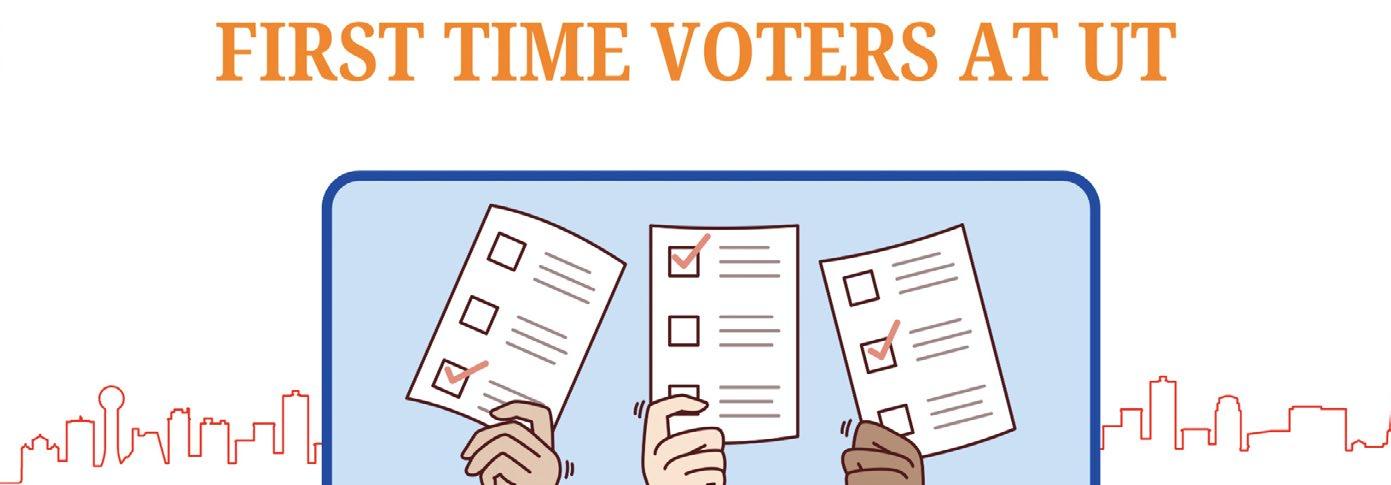
Emily Terry is a sophomore studying journalism and electronic media. She spoke on how monumental the previous presidential election was.
“Voting is important to me because I remember the 2020 election and I really wanted to vote but I couldn’t,” Terry said.
“Now, I actually can have my voice heard.”
Some undergraduates are hesitant about voting for various reasons. They may feel their vote won’t make a difference, lack understanding of the voting process or simply feel indifferent.
Terry spoke on how her state of residence impacts her perception on voting.
“I know for me in New York, for the bigger
races like presidential, it feels like my vote won’t matter since we already know the outcome of the votes,” Terry said.
Engle spoke on how to encourage students who are undecided about voting.
“My advice to students would be that there is no harm in voting,” Engle said.
“No matter who wins, at least you stayed true to your own values.”
Ryan also spoke on how to change students’ perceptions about participating in the election.
“I believe that it is good to tell students that every vote counts, because if everyone had the mentality that their vote didn’t count, then no one would vote.”
PORTANKA Engagement Editor
Imagine you go to the store for only three items — let’s say, toothpaste, apples and a loaf of bread. Only three items, yet you check out and all of a sudden you have spent $30. For many, this situation sounds too familiar. It is no secret that groceries and household items cost significantly more now than they did years ago. For college students managing either all or part of their own income and household, this issue is even more pertinent.
U.S food prices increased by 25% from 2019 to 2013, rising faster than housing and medical care prices. Food prices are expected to continue to increase in 2024 by 2.2%. This includes both food-at-home prices (grocery store purchases) and food-away-from-home (restaurant purchases). Food-at-home prices alone increased by 5% from 2022 to 2023.
“The same budget that I was using probably two years ago has doubled, I would say,” Hannah Thompson, a fifth-year senior studying sociology and criminal justice said.
Maura Dailey, a junior biomedical engineering major, noticed the biggest increase when the size of the household she was shopping for changed.
“I live with one other person, so going grocery shopping for my entire family of five

and feeding them, and then coming here and only feeding two people, I haven’t noticed that much of a difference. Which is saying a lot because a few years ago I would go grocery shopping with my mom for my family of five and it would be a few hundred dollars for a week or two. Now, I feel like I’m spending $200 to $300 every week or two for me and my roommate.”
Many students at UT are financially independent in some shape or form, whether it is all or part of a tuition bill, rent, grocery costs or all of the above.
“It’s definitely frustrating because I have to pay for part of my schooling,” Dailey said.
“I mean, I don’t pay for my groceries, my parents do, and I don’t like wasting their money. So, I’m definitely mindful of their money and I’m mindful of friends who are also going through this and seeing their grocery bills go up that they have to pay on their own.”
This increase in prices leaves students like Thompson feeling like they must make a choice between a basic necessity and a social life.
To combat the growing issue, students like Thompson and Dailey are finding solutions such as meal-planning and restricting unnecessary spending.
“We’re going in and making menus and lists of what we need,” Dailey said. “We try to only go grocery shopping every two weeks if we can. We don’t really have a budget, but we’re mindful of how much we’re spending.”
Dailey also utilizes products such as poultry and produce on sale rather than sticking to the same brand every time.
Making brand and store switches is a tactic Thompson has found helpful as well.
“I shop at Aldi now primarily,” Thompson said. “I’ll only come to Publix or Kroger for name brand things that I really want. Aldi right now is much more affordable.”
Some other solutions include signing up for loyalty rewards. Many grocery stores such as Kroger and Publix have apps and reward systems that give exclusive sales or discounts to members and are free to sign up.
Another solution is buying in bulk. While it may seem pricey in the moment, it has actually been shown to be cheaper and effective in the long run. This is a great solution for students who plan meals a week or two in advance, while also eliminating trips to the grocery store.
For students who may need more financial support, the Big Orange Pantry and Free Store on campus provide a variety of nonperishable food items, household items, hygiene products and other essential goods to support students.

ANSLEY GRAVES
Opinions
Editor
Being a fan of a celebrity means that you follow this person’s life, care about whatever their opinions and maybe even idolize them. Most true fans follow their favorite celebrities via social media, where they get a digital platform of what their respected artist is up to.
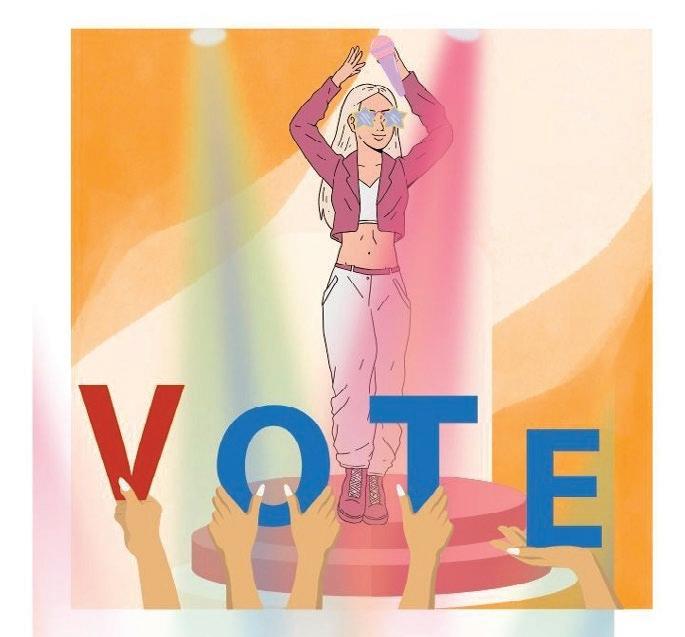
Opinions Editor Ansley Graves says, “Some younger people might not care about politics, or even voting, but whoever they are fans of might make them care.”
Ansley Graves / The Daily Beacon
With the upcoming election, certain celebrities have voiced their opinions about who they are or are not voting for, and interestingly enough, social media has proven what a difference it makes.
Celebrity endorsement can be known as an advertising strategy. The kind of celebrity endorsement that matters in this context, however, is the fate of the upcoming election in November.
If you are a fan of someone and they publicly make it known what their likes and dislikes are, or in this case their preferred political candidate, it is safe to say a part of that fan is going to see eye to eye with that celebrity. If not already supporting a side, they might switch up to see the political preferences of their favorite superstar.
One of the most well-known instances of endorsement was with world famous singer Taylor Swift and Vice President Kamala Harris. Taylor Swift publicly announced via Instagram that she would be voting for Kamala Harris. This gained an astounding amount of attention from her fans and potentially swayed people to vote for Kamala as well.
Essentially, when putting into perspective how many people might not have cared about the election but have the right to vote
in the United States, seeing a house-hold name vote for the Democratic candidate, will change their mind. Seeing their idol Taylor Swift support a candidate in one of the most important events happening in the world will most definitely have them change their mind on if they will vote or want to vote. It is incredible how a simple Instagram post has and will affect who the winner of this election will be.
Celebrity endorsement is not just closed off to one side of the political party. On the Republican side, Donald Trump has had fellow celebrities openly support him via social media. He even had billionaire and CEO Elon Musk speak at his rally.
This raises the question whether this is the true celebrities’ political view, or if this is an act — being paid or coerced to support a certain political candidate. While this might seem like a reach, as celebrities categorically are wealthier because of their fame, maybe they did it for money and this could be a response to greed. The public will probably never know if that is the case, of course.
The younger generation is quite literally the future of the world. Even if you do not know anything about politics, maybe take this election season to educate yourself. On the other hand, if all you know or care about politics is what your favorite celebrity is doing, your voice still matters. Vote!
at agrave24@vols.utk.edu.


Kamala Harris and Donald Trump are the two primary presidential candidates in the upcoming elections. Harris represents the Democratic party, and Trump represents the Republican party. However, they have each selected a vice president to run by their side and support them through their campaign and through election season as a whole.
These candidates are Tim Walz, running with Harris, and JD Vance, running with Trump. Each have been personally selected by their respective presidential candidate. The recent debate was a great highlight of their careers.
Senate and then the president. He worked among three committees in the house agriculture, armed services, and veterans affair during his time as a representative.
Prior to his time as a part of Congress and governor, he served as a member of the Army National Guard for 24 years before retiring as Command Sgt. Maj. This makes Walz the highest ranking enlisted soldier to work in Congress. He has a bachelor’s degree in social science earned from Chadron State College in Nebraska.
He has made improving veteran life one of his top priorities while serving in the government and has a strong work ethic because of his time spent in the military.
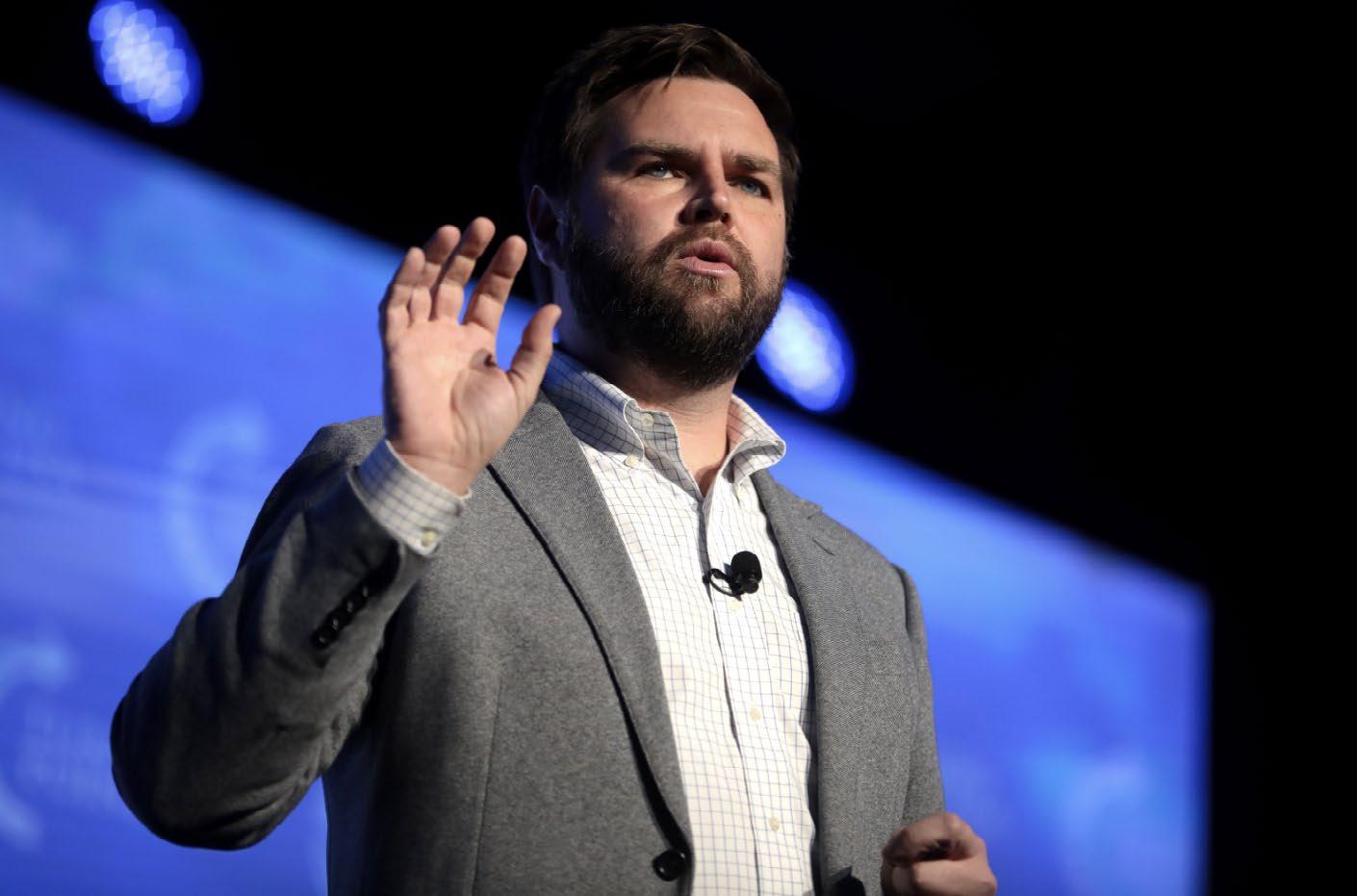
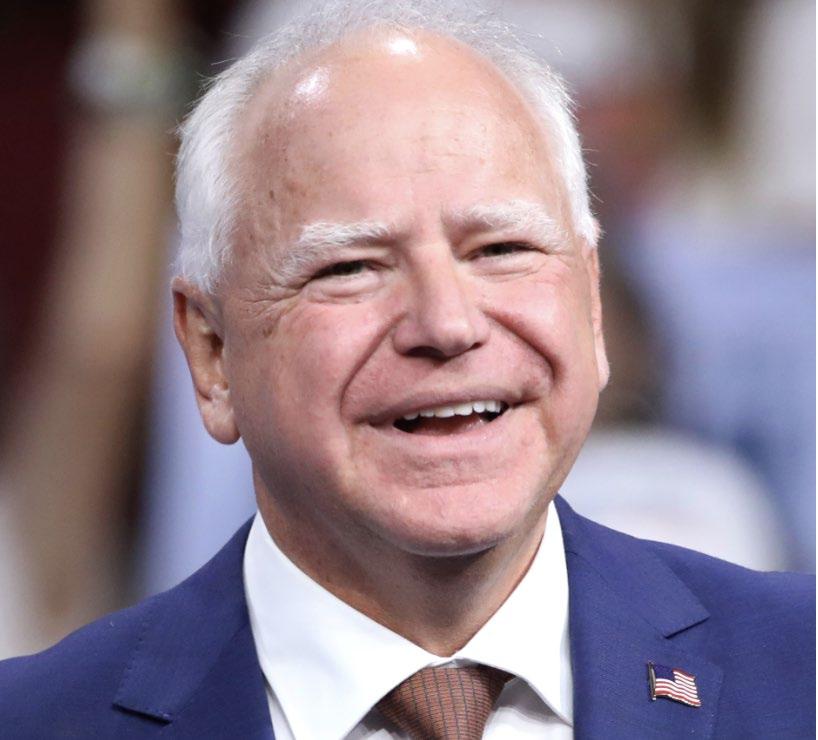
litical career to his upbringing, in which his mother and father divorced, then his mother went on to deal with drug and alcohol use disorders. He was raised primarily by his maternal grandparents and wants to bring more awareness to communities like that which he was raised in.
He published a memoir titled “Hillbilly Elegy: A Memoir of a Family and Culture in Crisis” in 2016 which outlined communities in poverty and how poverty was a “family tradition” for many people.
Vance and Walz both strive to support their presidential candidates and bring awareness to the issues that they are campaigning for prior to the election this November.
drastically different. There was a time where Vance called himself a “never Trump guy,” but as time went on they began to share many of the same views and ideas on various issues in the United States, one of those being immigration laws. Vance began to echo the voice of Trump, who endorsed Vance during his election in 2019 for United States Senate, which went on to create their relationship and now will be running on the 2024 presidential ticket together.
“Watching the VP debate was so interesting because there was a level of respect that I haven’t seen in politics for a little bit. Both candidates made good points and acknowledged the other’s perspective even if their views didn’t align,” is how Madi Rogers, a sophomore chemical engineering major, described the event.
The history behind the two candidates is also very important.
Walz is currently serving as the governor of Minnesota and was previously a representative for Minnesota for three terms. He was a representative of the state in the House of Representatives and worked towards passing legislation to move to the
Vance currently serves as one of two senators representing the state of Ohio, and is running alongside Trump for this election.
He enlisted in the Marine Corps in 2003, shortly after graduating from Middletown High School in Ohio. He fought for the country in the Iraq War during his time in the military. After returning from deployment he sought out a bachelor’s degree in political science and philosophy in 2009 from The Ohio State University. Later he went on to Yale Law School and earned his law degree in 2013.
He attributes a large part of his po-
One of Harris’ main goals for choosing a vice presidential candidate was to balance out her ticket. She is a Black and Indian woman who is the first to be representing a major party ticket, and her hope is that choosing a Midwestern man who is white will bring more citizens to vote for them. Further, Walz is a gun owner from a rural Republican-dominant town, which will show the country that there is more behind a political party than what some seem to understand.
Typically, the Democratic party is against gun ownership and use in the country, but by having a representative of this issue on her ticket, it could sway some votes their way.
The story behind Vance and Trump is
“Vice presidential candidates are extremely important to research in addition to presidential candidates because they are a reflection of the president. They hold an important office, and their qualifications and past makes this research relevant,” Caroline Marcus, a sophomore public administration and economics major, said. The vice president elect is just as important as the president elect when it comes to the federal government. Each has their own views and stands on their own side of politics when it comes to several different issues surrounding the government. Researching the president and vice president candidates is important when it comes to modern elections because not every issue is black and white, and each candidate has different views when it comes to these issues.
CADEN DYER
Copy Chief
One-third of voting-eligible Americans did not vote in the 2020 presidential election. Many people vote “intermittently,” according to Pew Research Center. These intermittent individuals can be a large reason why swing states “swing” one way or the other come election season.
For many, the choice to vote or not vote stays consistently the same.
“I think it’s important to vote because who the president is directly impacts your everyday life. It’s a big decision.” Em Rippie, a sophomore studying journalism and media, said. “My family has always voted, and I think that’s one of the things that’s pushed me so hard. … We have very opposing views (so) it’s more motivation for me to vote. People are pushing for these policies that are very real and very scary.”
But the facts remain — a sizable portion of eligible voters simply “opt out” of this Constitutional right. Why?
Jake Sheffey is 19 years old and recently eligible to vote. The Englewood, Tennessee native who is majoring in mechanical engineering will not be voting in the 2024 presidential election.
“I don’t see much the point in it, since the state is so red,” Sheffey said. “It’s gonna vote red, regardless of whether I vote or not.”
Tennessee is indeed a “deep red state,” according to 270ToWin. Prior to World War II, though, Tennessee was a Democratic state — it has only voted Republican 51.6% of the time since 1900.
Something changed around the 1950s, leading Tennessee into the red. An exception would be Democratic presidential candidate Bill Clinton in 1992 and 1996 — and one would surmise the cause to be his vice president Al Gore, who had previously represented Tennessee in the U.S.House of Representatives. Loyalty to Gore only went so far, though — he lost the state as
the head of the Democratic ticket in 2000.
Conveniency can be a factor in the decision to vote.
“I don’t really find it convenient to go voting,” Sheffey said. “(So I’m) just not going to because I don’t feel like it matters. At least in Tennessee (because) it’s a swing state.”
“If you can’t get a ride, forget about voting,” Gabrielle Gurley wrote for The American Prospect in 2018. She cited the 2016 Survey of the Performance of American Elections, which reported that around 19% of registered young voters with college experience said that a lack of transportation kept them from voting.
Childhood experiences can also influence a person to vote or not vote.
Braylan Harris is a 23-year-old and Tennesse native. He does not plan to vote in this year’s upcoming election.
“I don’t vote because growing up I never heard anything positive about voting. I always heard, ‘Your vote don’t count’ or conspiracy theories about voting,” Harris said.
Understanding the ballot issues and the political atmosphere of the times is just as important. For Harris, the additional feeling of uncertainty as to where he stands politically will be keeping him from the polls this year.
“I am open to the decision to vote, (and) I feel like everyone should have the right to vote, but you should understand what you’re voting for,” Harris said. “And because I don’t have that understanding, I just don’t vote.”
Regardless of where you stand on this issue, it’s important to know the voting resources available to you in the upcoming month.
Early voting ends Oct. 31. The Howard H. Baker Jr. Center is one location where you can participate in early voting. Out-of-state students can use mail-in ballots if they will not be traveling home to vote. In-state students can vote at their assigned districts.
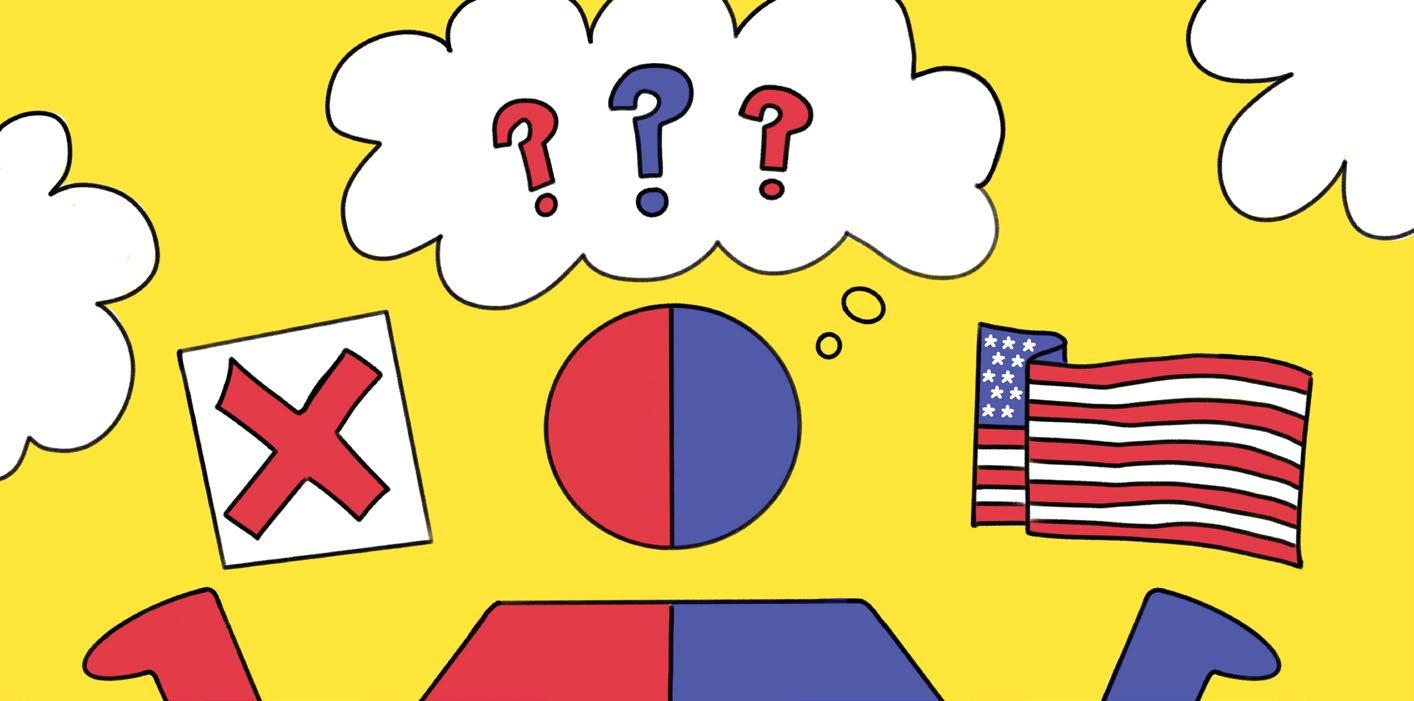
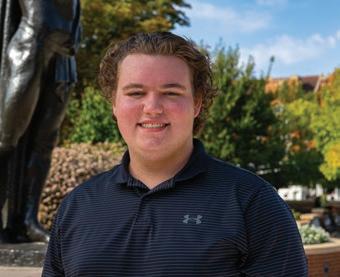





Syracuse at pittsburgh boise state at unlv notre dame at navy missouri at alabama illinois at oregon texas at vanderbilt lsu at texas a&m
Syracuse at pittsburgh boise state at unlv notre dame at navy missouri at alabama illinois at oregon texas at vanderbilt lsu at texas a&m
Syracuse at pittsburgh boise state at unlv notre dame at navy missouri at alabama illinois at oregon texas at vanderbilt lsu at texas a&m
Syracuse at pittsburgh boise state at unlv notre dame at navy missouri at alabama illinois at oregon texas at vanderbilt lsu at texas a&m
Syracuse at pittsburgh boise state at unlv notre dame at navy missouri at alabama illinois at oregon texas at vanderbilt lsu at texas a&m
Syracuse at pittsburgh boise state at unlv notre dame at navy missouri at alabama illinois at oregon texas at vanderbilt lsu at texas a&m
EMMA LOVE Managing Editor
This semester, there are approximately 1,400 international students attending UT, representing more than 100 countries from around the world. With an enrollment of 38,728 total students, international students make up 3.7% of UT’s student population.
That means 3.7% of UT students are not able to vote in this year’s upcoming presidential election. But these students are still bound to U.S. law and impacted by U.S. political decisions for as long as they are in the country. More significantly, they live in the American political environment and are thus inevitably exposed to political dialogue.
The “spectacle” of American politics is something senior journalism and media major Pier Sakker, originally from Australia, and senior electrical engineering major Tunmise Owotomo, originally from Nigeria, noted as different from their home countries.
“At home our politicians are just regular people,” Sakker said. “The prime minister can go out for a run in the morning, and I’m sure people are like, ‘Oh, that’s the guy,’ but we don’t have the whole secret service motorcade whole shabam around it.”
Despite Australian politicians being less of a spectacle than their American counterparts, the Australian newsfeed is saturated with American politics and election coverage, according to Sakker.
Sakker explained that Australian politics are more about civil service than they are about your identity as a citizen. And while Australians’ political beliefs moreso “skirt around the center” than lean starkly left or right, American politics and elections have created a divide between Australians from across the globe.
“We’re not even in the country and people are saying, ‘Well, if I could vote, I’d do this or I feel like they should do that,’” Sakker said. “And it’s kind of even polarizing between Australian citizens about what your American political beliefs may be.”
Owotomo, who takes a neutral stance toward American politics, observed that political views are deeply tied to American’s’ personal lives, which came as a surprise when she entered the country.
“I think one culture shock when coming to America is American politics,” Owotomo said. “How even the politics dictates so much of your personal life. ... I could tell from what someone believed in what political party they belong to, which was
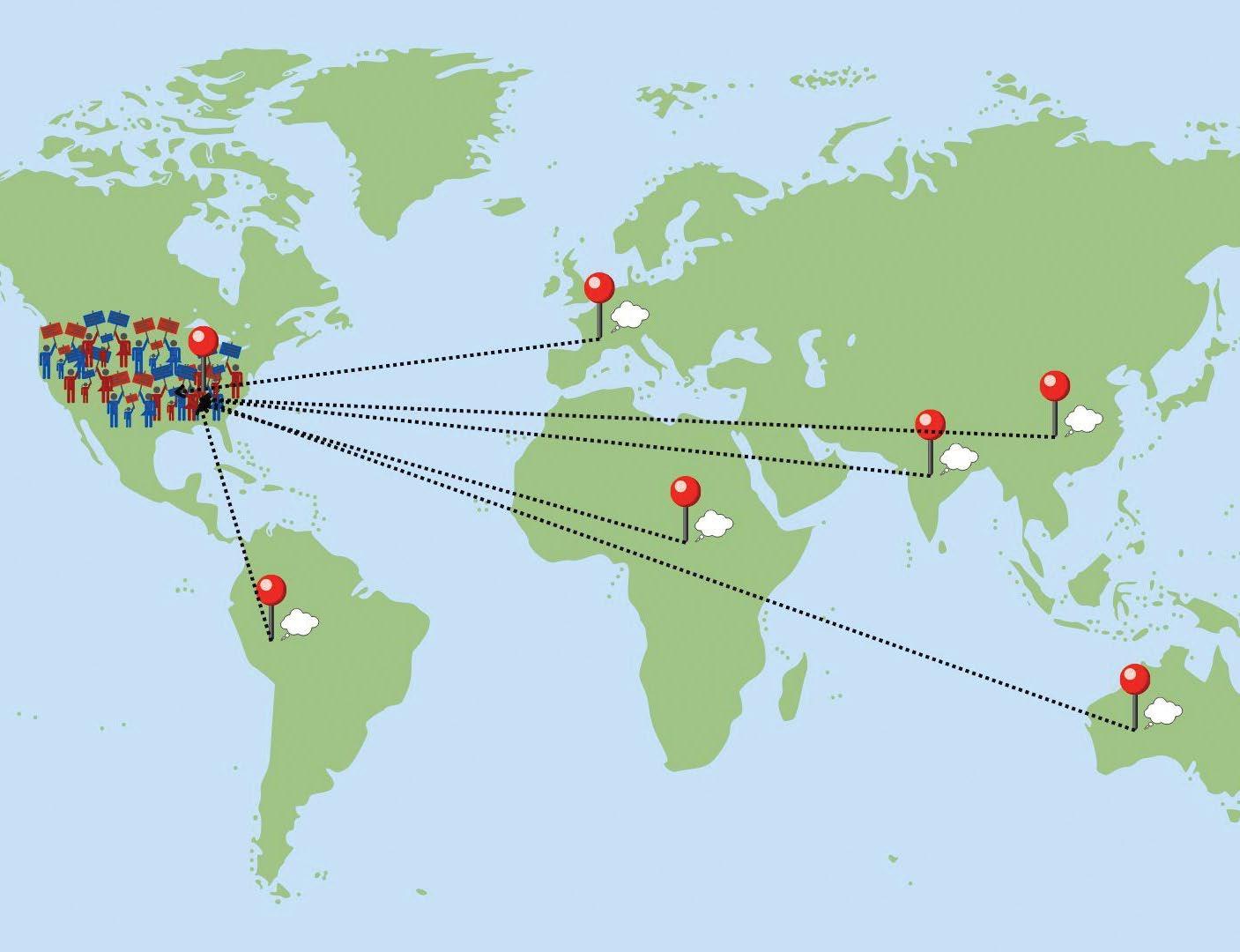
UT hosts just under 1,300 international students from locations all around the globe, all of whom have their own distinct ideas and values. Sunday, Oct. 20, 2024. Emma Love / The Daily Beacon
not the way it was in Nigeria.”
Living with an American host family, Owotomo emphasized that she looks at U.S. politics from a Christian standpoint. She emphasized that from that perspective, no political party is perfect and that they shouldn’t be treated as though one is inherently “more Christian” than another.
Owotomo believes that the most important aspect to consider when choosing between candidates is who is going to “take the nation forward.”
“None of the parties are perfect — none of them are,” Owotomo said. “And I don’t know why Christians keep trying to make it look like one is. … So I feel like I would just encourage people to vote for the person that we should think is the best possible thing.”
While both international students asserted that gun laws — due to gun violence — are an issue that they care about even as non-voters, they also each try to
stay out of political and election-related conversations.
“I am quite new on the scene,” Sakker said. “I haven’t really felt like I have the right to have those kinds of conversations just yet. I’m still kind of earning my stripes and I’ve just landed — I’d like to stay. So, I personally find it something that I don’t really like to engage in conversation with people.”
Owotomo finds some relief in knowing that she can’t vote. Because of this, she doesn’t find this election season to have a considerable impact on her personal life.
“I think the reason why it doesn’t is because I don’t have to vote, so I’m not thinking about it,” Owotomo said. “It’s like I’m a spectator from outside. I’m just watching all this happen.”
These “outside spectators” have a front row seat to this year’s election, even without the ability to participate in it.
“I think one culture shock when coming to America is American politics. How even the politics dictates so much of your personal life...”
TUNMISE OWOTOMO Senior Electrical Engineering Major